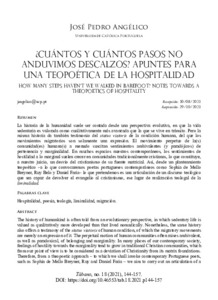Please use this identifier to cite or link to this item:
https://repositorio.uca.edu.ar/handle/123456789/13301| Título: | ¿Cuántos y cuántos pasos no anduvimos descalzos?: Apuntes para una teopoética de la hospitalidad How many steps haven’t we walked in barefoot?: Notes towards a theopoetics of hospitality |
Autor: | Lopes Angélico, José Pedro | Palabras clave: | HOSPITALIDAD; POESIA; MIGRACION; LITERATURA; CRISTIANISMO; TEOLOGIA | Fecha de publicación: | 2021 | Editorial: | Universidad Católica Argentina. Facultad de Filosofía y Letras. Centro de Estudiantes de Filosofía | Cita: | Lopes Angélico, J. P. ¿Cuántos y cuántos pasos no anduvimos descalzos?: Apuntes para una teopoética de la hospitalidad [en línea]. Tábano. 2021, 18. doi: https://doi.org/10.46553/tab.18.2021.p144-157. Disponible en: https://repositorio.uca.edu.ar/handle/123456789/13301 | Resumen: | Resumen:
La historia de la humanidad suele ser contada desde una perspectiva evolutiva, en que la vida
sedentaria es valorada como cualitativamente más avanzada que la que se vive en tránsito. Pero la
misma historia da también testimonio del status viatoris de la condición humana, del que los
movimientos migratorios son solamente una expresión. El movimiento perpetuo de la(s)
comunidad(es) humana(s) a menudo suscitan sentimientos ambivalentes (y paradójicos) de
pertenencia y marginalidad. En muchos espacios nuestros contemporáneos, los sentimientos de
hostilidad a lo marginal suelen crecer en comunidades tradicionalmente cristianas, lo que constituye,
a nuestro juicio, un desvío del cristianismo de su fuente matricial. Así, desde un planteamiento
teopoético –a lo que convocaremos poetas portugueses contemporáneos como Sophia de Mello
Breyner, Ruy Belo y Daniel Faria– lo que pretendemos es una articulación de un discurso teológico
que sea capaz de devolver el evangelio al cristianismo, ese lugar de realización teologal de la
liminalidad. Abstract: The history of humankind is often told from an evolutionary perspective, in which sedentary life is valued as qualitatively more developed than that lived nomadically. Nonetheless, the same history also offers a testimony of the status viatoris of human condition, of which the migratory movements are merely an expression of it. The perpetual motion of human communities often raises ambivalent, as well as paradoxical, of belonging and marginality. In many places of our contemporary society, feelings of hostility towards the marginality tend to grow in traditional Christian communities, which from our point of view is to be considered as a deviation of Christianity from its matrix foundations. Therefore, from a theopoetic approach – to which we shall invoke contemporary Portuguese poets, such as Sophia de Mello Breyner, Ruy and Daniel Faria – we aim to carry out an articulation of a theological discourse to return the Gospel to Christianity, that place of theological accomplishment of liminality. |
URI: | https://repositorio.uca.edu.ar/handle/123456789/13301 | ISSN: | 1852-7221 2591-572X (online) |
Disciplina: | LITERATURA | DOI: | https://doi.org/10.46553/tab.18.2021.p144-157 | Derechos: | Acceso abierto | Fuente: | Tábano No.18, 2021 |
| Appears in Collections: | TAB - 2021 nro. 18 |
Files in This Item:
| File | Description | Size | Format | |
|---|---|---|---|---|
| cuantos-cuantos-pasos.pdf | 450,83 kB | Adobe PDF |  View/Open |
Page view(s)
62
checked on Apr 27, 2024
Download(s)
63
checked on Apr 27, 2024
Google ScholarTM
Check
Altmetric
Altmetric
This item is licensed under a Creative Commons License

